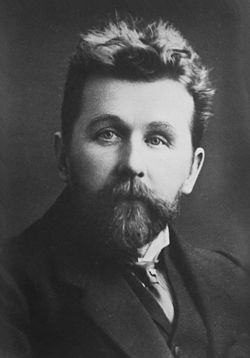Alexander Tichonowitsch Grechaninov
Alexander Tichonowitsch Gretschaninow ( Russian Александр Тихонович Гречанинов ., Scientific transliteration Aleksandr Tichonovič Grečaninov ; born 13 jul. / 25. October 1864 greg. In Moscow , † 3. January 1956 in New York ) was a Russian composer.
Life
Grechaninov made his first encounters with music in a church amateur choir. From 1881 he studied (against the will of his father, a businessman) piano, counterpoint, harmony and fugue composition as well as form theory at the Moscow Conservatory a . a. with Anton Arenski and Sergei Taneyev . In 1890 he moved to the St. Petersburg Conservatory to study composition with Nikolai Rimsky-Korsakov until 1893 . After initial success as a composer, he returned to Moscow in 1896, where he first turned to church music and later to incidental music in the form of a collaboration with the Moscow Art Theater. Until the October Revolution , Grechaninov taught (including at the Gnesin Institute), wrote for magazines and worked as a conductor. His pedagogical activities (e.g. as leader of children's choirs) must be emphasized.
After the October Revolution, which meant the end of an originally lifelong pension that he received from the Tsar for his “2nd Liturgy of St. John Chrysostom “received, Grechaninov was increasingly active in public functions. In 1925 he moved to Paris without breaking with Soviet power . He went on concert tours more often before he decided in 1939 to emigrate to the USA due to the threatening political situation . From 1940 he lived in New York . During the Second World War he wrote several compositions that were intended to support the troops of the Red Army . In 1946 he received US citizenship. Grechaninov received numerous prizes and awards throughout his life.
style
Grechaninov's early works show the influence of his teacher Rimsky-Korsakov . Later on, Grechaninov opened up to western trends: initially (especially in his early operas) he incorporated elements of Richard Wagner into his style, and from 1910 onwards he oriented himself particularly towards the more recent French music . Pyotr Ilyich Tchaikovsky always remained a point of reference for him . Overall, despite a distinctly “Russian” tone, he was comparatively cosmopolitan. However, he remained connected to tradition, so that his works sound rather conservative.
Grechaninov's sacred music is shaped by efforts to renew it through a return to the oldest Russian traditions. He is considered the main representative of this movement, the so-called "Moscow School" or "New Direction". Often Grechaninov devoted himself to works for children such as piano pieces for children and children's operas. After his death, Grechaninov, who was highly regarded during his lifetime, was quickly forgotten, while he was in the Soviet Union v. a. was largely ignored because of his emigration . However, in today's Russia, in the course of the new religious affiliation that has recently been observed , his spiritual works are receiving increasing attention.
Works
- Orchestral works
- Symphony No. 1 in B minor, Op. 6 (1894)
- Symphony No. 2 in A major op. 27 Pastorale (1902-09)
- Symphony No. 3 in E major, Op. 100 (1920–24)
- Symphony No. 4 in C major, op.102 (1923/24)
- Symphony No. 5 in G minor, Op. 153 (1936–38)
- Drama music
- Concerts
- Violoncello Concerto in A minor, Op. 8 (1895)
- Violin Concerto op.132 (1932)
- Concerto for flute, string orchestra and harp op.159 (1938)
- Operas
- Dobrynja Nikitic op. 22 (1895–1901)
- Soeur Betrice op. 50 (1908-10)
- The dream of the Christmas tree , children's opera op.55 (1911)
- The cat, the rooster and the fox , children's opera op.103 (1924)
- The Wedding op. 180 (1946)
- Other vocal music
- 1. Liturgy of St. John Chrysostom op.13 (1897)
- 2. Liturgy of St. John Chrysostom op.29 (1901)
- Holy Week op.58 (1911/1912)
- Missa oecumenica op. 142 (1933–36)
- Missa festiva op.154 (1937)
- Et in terra pax , Mass op.166 (1942)
- Hymn to a Free Russia (1917)
- Vers la victoire (1943)
- Songs / children's songs
- Chamber music
- 4 string quartets (No. 1 in G major op. 2, 1892/93, No. 2 in D minor, op. 70, 1913/14, No. 3 in C minor, op. 75, 1915/16, No. 4 in F- Major op.124, 1929)
- 2 piano trios (No. 1 in C minor, Op. 38, 1906, No. 2 in G major, Op. 128, 1930/31)
- 2 violin sonatas (No. 1 in D major op.87, 1918/19, No. 2 in C minor, op.137, 1933)
- Violoncello Sonata in E minor, Op. 113 (1927)
- Early in the morning op. 126b for violoncello and piano
- Piano music
- Sonata No. 1 in G minor, Op. 129 (1931)
- Sonata No. 2 op.174 (1942)
- smaller pieces
- Children's pieces
Web links
- Sheet music and audio files by Grechaninov in the International Music Score Library Project
- Russian Music Archive: more detailed catalog of works
- Works by and about Alexander Tichonowitsch Gretschaninow in the catalog of the German National Library
| personal data | |
|---|---|
| SURNAME | Grechaninov, Alexander Tichonowitsch |
| ALTERNATIVE NAMES | Гречанинов, Александр Тихонович (Russian); Grečaninov, Aleksandr Tichonovič (scientific transliteration) |
| BRIEF DESCRIPTION | Russian composer |
| DATE OF BIRTH | October 25, 1864 |
| PLACE OF BIRTH | Moscow |
| DATE OF DEATH | January 3, 1956 |
| Place of death | New York City |
